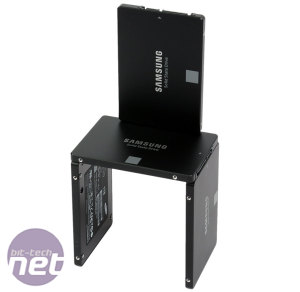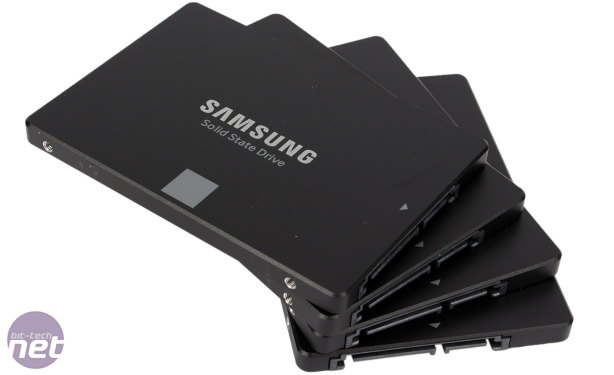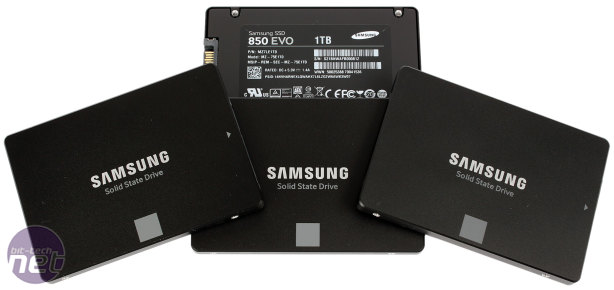
Performance Analysis
Sequential performance is equally high across all four capacities of the SSD 850 EVO, with not a single read or write result below 500MB/sec and never a difference of more than 8MB/sec between any two of the drives. It's particularly pleasing to see a 120GB SSD performing so fast, though of course if you fill the TurboWrite buffer in a single command this won't be the case.Random performance at QD1 is improved across the board. The read speeds put the four SSD 850 EVO drives at the top of both the AS SSD and CrystalDiskMark charts, in which they take the top spot from the SSD 840 EVO. Write speeds are not chart topping – that privelege belongs to drives that use OCZ's Barefoot 3 controller – but they're not far off. Interesting, the 1TB model is a little slow for both read or writes. It's not by much, but it's a recognisable pattern. This is most likely due to differences between the MEX controller that the 1TB drive uses and the MGX controller that the other three use.
At higher queue depths (QD64 in AS SSD, QD32 in CDM), the SSD 850 EVO drives are effectively equal when it comes to read speeds, with speeds for all four that are right near the top of the charts where the SSD 850 PRO and Plextor M6 PRO reside. As such, the drives are substantially faster than the MX100, though these workloads are not very relevant for users in this bracket. Write speeds here tell an interesting story. In CDM (QD32), all drives are roughly the same and very fast, as the specs table predicted they would be, and the 250GB SSD 850 EVO improves by 19 percent over the SSD 840 EVO, which is again as Samsung said. However, at the even more strenuous QD64 test in AS SSD, only the 500GB and 1TB drives can maintain their high levels of performance, with speeds of around 330MB/sec. Meanwhile, the 250GB falls to 272MB/sec, while the 120GB manages just 143MB/sec. Thankfully, this type of workload is highly unlikely to be used with these drives, so it's nothing to be concerned about.
The SSD 850 EVO manages between 125MB/sec and 128MB/sec in the PCMark 7 Starting Applications test, with all four just managing to trump the MX100, though not by anything meaningful. Here, the 500GB and 250GB models improve by a healthy 11 and 16 percent respectively. In the Gaming workload, the SSD 850 EVO drives do very well again, and the 120GB and 250GB models actually do best with over 153MB/sec each. BootRacer has always favoured lower capacity drives, and indeed the 120GB and 250GB drives boot into Windows 7 faster than the larger models. The 1TB drive is particularly slow here – not only is it large, but we also saw it do a little worse than the other three in the QD1 random read tests, which is a benchmark that's very relevant to booting an OS.
In the intensive mixed workloads test with Iometer the SSD 850 EVO drives show definite improvements over the previous generation, but they are not really designed for workloads of this calibre and are generally unable to compete with professional level drives. The higher capacities typically do better here as they fill up less quickly. In fact, the 1TB and 500GB drives manage a higher score than even the 256GB SSD 850 PRO in the File Server benchmark. Our final Iometer test hammers the drives with random writes for 12 hours to achieve steady state performance, and here the 250GB SSD 850 EVO has the lowest average IOPS and highest average response time of the drives tested. The SSDs that do best here, the OCZ Arc 100 and AMD Radeon R7 SSD (also built by OCZ), do so in part because they have more spare area (they are 240GB models rather than 250GB or 256GB). Thankfully, Samsung Magician makes it very easy to overprovision your SSD 850 EVO, which will improve steady state performance, though again for most everyday users this criteria isn't that important anyway.
Conclusion
The SSD 850 EVO offers more performance and endurance than its predecessor. It also sports an excellent feature set too, including RAPID Mode, advanced encryption protocols and the DEVSLP power state. However, it also comes with a higher price tag to match. At the 1TB capacity, the Crucial M550 is a cheaper alternative, and the Crucial MX100 is particularly good value at the other three capacities. Both of these drives also comes with RAIN and basic power loss protection too, which may appeal to some users. However, neither of these have anything akin to Samsung's RAPID Mode or TurboWrite features to accelerate performance. The software support from Samsung is also outstanding, the SSD 850 EVO has a five year warranty compared to three on the two Crucial SSDs.As such, your choice of SSD at the moment really comes down to your own priorities. For general, everyday office use where tasks are mostly limited to office programs and web browsing, the MX100 will suffice at any capacity, as performance differences aren't likely to be noticed. However, people who consider themselves to be more power users may want to consider spending more on the Samsung, especially those who do a lot of write-intensive tasks, as TurboWrite and RAPID Mode will both help out here, especially if you're shopping in the 120GB or 250GB category. No SSD is perfect for everyone, but there's no denying the quality on offer with the SSD 850 EVO range – if they fit the bill for your workload, they come highly recommended at every capacity.
Samsung SSD 850 EVO 120GB and 250GB Score

Samsung SSD 850 EVO 500GB and 1TB Score

Samsung SSD 850 EVO 500GB and 1TB Score


MSI MPG Velox 100R Chassis Review
October 14 2021 | 15:04











Want to comment? Please log in.